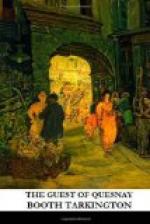A note lay beside my plate next morning, addressed in a writing strange to me, one of dashing and vigorous character.
“In the pursuit of thrillingly scientific research,” it read, “what with the tumult which possessed me, I forgot to mention the bond that links us; I, too, am a painter, though as yet unhonoured and unhung. It must be only because I lack a gentle hand to guide me. If I might sit beside you as you paint! The hours pass on leaden wings at Quesnay—I could shriek! Do not refuse me a few words of instruction, either in the wildwood, whither I could support your shrinking steps, or, from time to time, as you work in your studio, which (I glean from the instructive Mr. Ferret) is at Les Trois Pigeons. At any hour, at any moment, I will speed to you. I am, sir,
“Yours, if you will but breathe a ‘yes,’
“Anne Elliott.”
To this I returned a reply, as much in her own key as I could write it, putting my refusal on the ground that I was not at present painting in the studio. I added that I hoped her suit might prosper, regretting that I could not be of greater assistance to that end, and concluded with the suggestion that Madame Brossard might entertain an offer for lessons in cooking.
The result of my attempt to echo her vivacity was discomfiting, and I was allowed to perceive that epistolary jocularity was not thought to be my line. It was Miss Elizabeth who gave me this instruction three days later, on the way to Quesnay for “second breakfast.” Exercising fairly shame-faced diplomacy, I had avoided dining at the chateau again, but, by arrangement, she had driven over for me this morning in the phaeton.
“Why are you writing silly notes to that child?” she demanded, as soon as we were away from the inn.
“Was it silly?”
“You should know. Do you think that style of humour suitable for a young girl?”
This bewildered me a little. “But there wasn’t anything offensive—”
“No?” Miss Elizabeth lifted her eyebrows to a height of bland inquiry. “She mightn’t think it rather—well, rough? Your suggesting that she should take cooking lessons?”
“But she suggested she might take painting lessons,” was my feeble protest. “I only meant to show her I understood that she wanted to get to the inn.”
“And why should she care to ’get to the inn’?”
“She seemed interested in a young man who is staying there. ‘Interested’ is the mildest word for it I can think of.”
“Pooh!” Such was Miss Ward’s enigmatic retort, and though I begged an explanation I got none. Instead, she quickened the horse’s gait and changed the subject.
At the chateau, having a mind to offer some sort of apology, I looked anxiously about for the subject of our rather disquieting conversation, but she was not to be seen until the party assembled at the table, set under an awning on the terrace. Then, to my disappointment, I found no opportunity to speak to her, for her seat was so placed as to make it impossible, and she escaped into the house immediately upon the conclusion of the repast, hurrying away too pointedly for any attempt to detain her—though, as she passed, she sent me one glance of meek reproach which she was at pains to make elaborately distinct.




